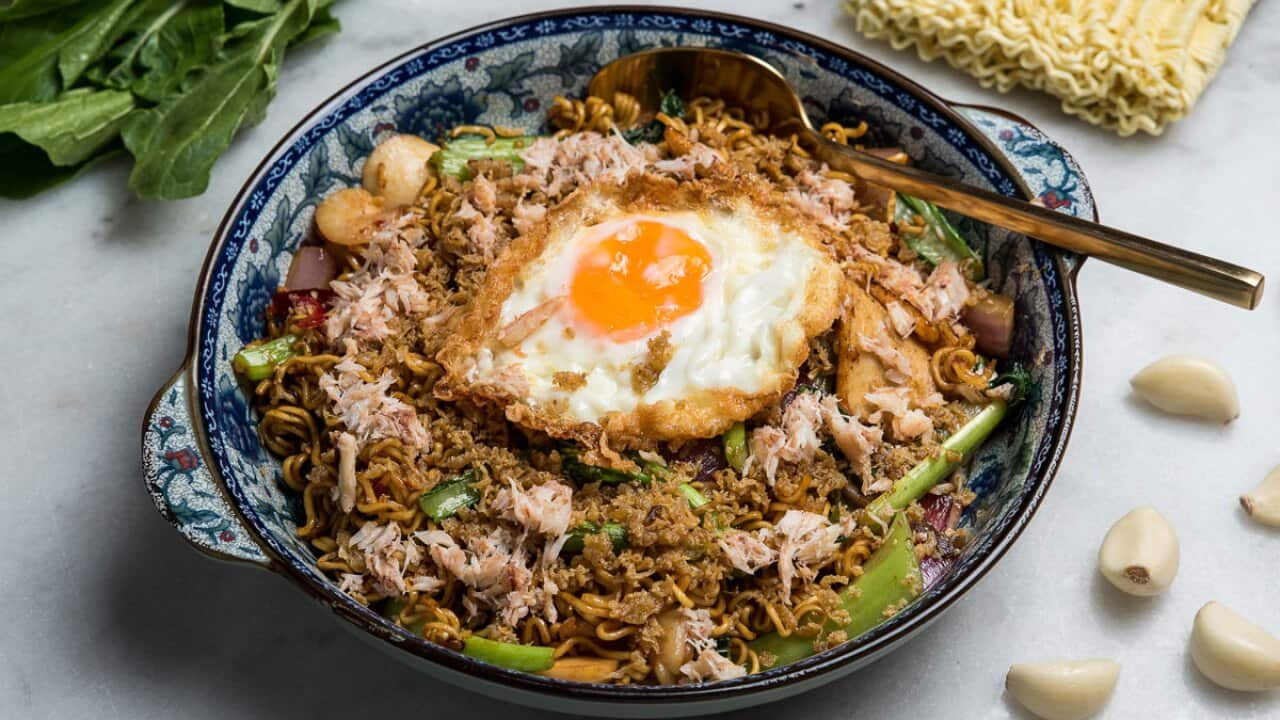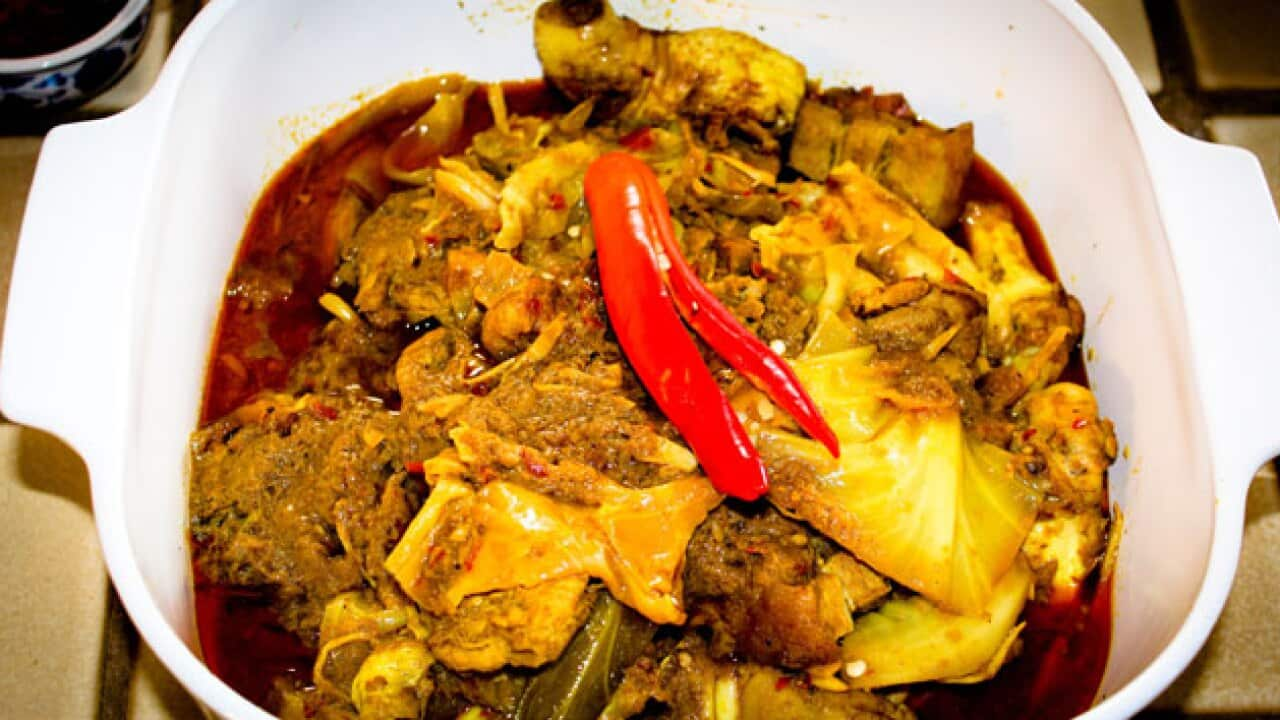, where colonial buildings sit alongside Hokkien temples and the scent of lemongrass wafts out of tumbledown shophouses, celebrates its history of immigration through its favourite foods. Since the 13th century, the Penang capital, along with nearby Malacca and Singapore, has attracted Chinese immigrants who went on to marry Malay locals. They also conceived – a thrilling concoction of Chinese and Malay culinary influences – in the process.
For , Nyonya dishes are bound up in childhood. When Khoo was growing up on George Town’s , was part of the fabric of his family. The self-taught chef, who moved to Sydney from George Town as a teenager, has made it his mission to introduce Nyonya dishes to Sydney diners at his Chinatown restaurant .
“In Penang, where there is a big Nyonya community, it was the food that grandma used to cook for us the most and I think it is one of Malaysia’s most delicious cuisines,” he tells SBS. “The Nyonya cuisine in Penang has more of a Chinese influence and then down south, in Malacca, you taste more of the Malay base. The Chinese-style versions are heavier on the chilli and take less cooking time. The Malay focuses on the herbs and is more aromatic. Nyonya food is specific to every region.”
Khoo worked in finance before opening the original Ho Jiak outpost in 2015 in Strathfield; the second Ho Jiak, which launched in Chinatown last year, is more directly influenced by his grandmother – but he isn’t hemmed in by tradition. He experiments heavily in the kitchen. For the past seven years, his grandmother has had Alzheimer’s disease so he relies on his own recollections and – his words – re-imagines Nyonya staples via modern techniques. Khoo’s version of , a meat roll seasoned with five-spice powder, wrapped in bean curd and deep-fried until crispy, is fattier and more indulgent than the original Nyonya dish, which has Teochew and Hokkien roots.
Khoo’s version of , a meat roll seasoned with five-spice powder, wrapped in bean curd and deep-fried until crispy, is fattier and more indulgent than the original Nyonya dish, which has Teochew and Hokkien roots.

Ho Jiak's loh bak (five-spice meat rolls). Source: Ho Jiak
“In Malaysia, it uses the cheapest cut of pork but here, I didn’t want it to be tough – so I use pork jowl which is fatty and soft,” he grins.
In Penang, where there is a big Nyonya community, it was the food that grandma used to cook for us the most and I think it is one of Malaysia’s most delicious cuisines.
“At the moment, my favourite is the assam Nyonya, which is steamed fish – it features 15 different types of herbs, which you sauté first before steaming. It’s spicy, sour and sweet. At first, I thought – no one is going to eat this! But now people are willing to try whatever we put on the menu.” Terrance Khor is the owner of , in Melbourne’s Docklands – one of the city’s only Nyonya eateries. Khor, who grew up in the state of Perlis near the border of Thailand, also owes his relationship to Nyonya cooking to his grandmother. He fondly recalls enjoying her – which translates to “chicken, captain”, a nod to a cook who invented the Chinese-Malay dish for a British sailor.
Terrance Khor is the owner of , in Melbourne’s Docklands – one of the city’s only Nyonya eateries. Khor, who grew up in the state of Perlis near the border of Thailand, also owes his relationship to Nyonya cooking to his grandmother. He fondly recalls enjoying her – which translates to “chicken, captain”, a nod to a cook who invented the Chinese-Malay dish for a British sailor.

The assam Nyonya dish at Ho Jiak. Source: Ho Jiak
At Bababoi, the aromatic chicken curry, which is laced with galangal, lemongrass and candlenuts, is on the menu along with Nyonya classics such as slow-cooked pork marinated in tamarind and a savoury fish custard, wrapped in banana leaves, known as .
For Khor, who stays true to his family recipes, Nyonya cooking is all about the , a paste that’s the base of every recipe.
“For Nyonya food, the most important thing is rempah, the spice paste which is a blend of shallot, garlic, lemongrass, chilli, shrimp paste and candlenuts, which makes it thick,” says Khor. “You have to make it from scratch.” At Ho Jiak, Khoo is known to spike his dishes with ingredients you may not find in his hometown – wagyu beef, lobster, truffles. Sometimes, this approach comes under fire – but then, few traditions in cookery reflect the magic of adapting to new places like Nyonya cuisine.
At Ho Jiak, Khoo is known to spike his dishes with ingredients you may not find in his hometown – wagyu beef, lobster, truffles. Sometimes, this approach comes under fire – but then, few traditions in cookery reflect the magic of adapting to new places like Nyonya cuisine.

The rendang with wagyu at Ho Jiak. Source: Ho Jiak
“Australian produce is so beautiful, whenever we get truffles or scallops I challenge myself to make a dish,” he says. “People tell me that at Ho Jiak, we’re not authentic and I say, ‘you’re right.' I want to educate people about how delicious Malaysian food can be.”









